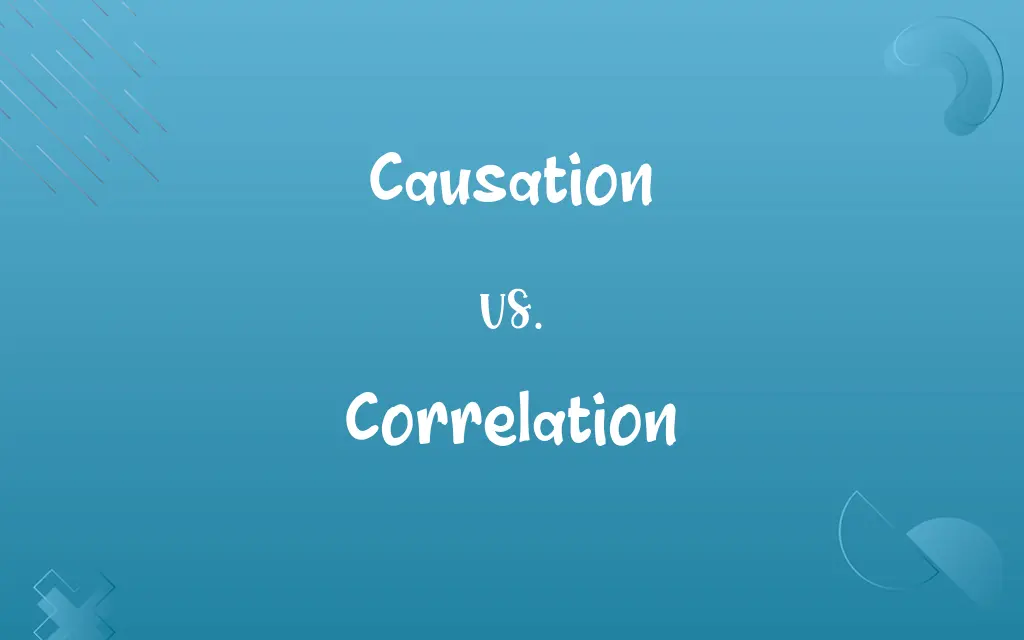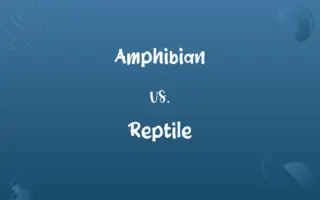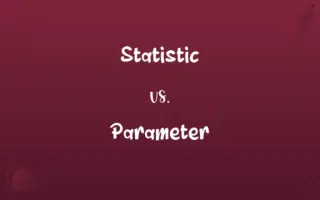Causation vs. Correlation: Know the Difference

By Shumaila Saeed || Updated on December 25, 2023
Causation implies that one event is the result of the occurrence of the other event; Correlation indicates that two events occur together without establishing a cause-effect relationship.

Key Differences
Causation directly implies that a change in one variable is responsible for a change in another, indicating a cause-and-effect relationship. Correlation, however, simply means that two variables tend to change at the same time, without proving that one causes the other.
Shumaila Saeed
Nov 17, 2023
In causation, one event can be identified as the cause of the other, such as smoking causing lung cancer. In correlation, two events may occur together like ice cream sales and drowning incidents, but one does not cause the other.
Shumaila Saeed
Nov 17, 2023
Establishing causation requires a rigorous demonstration of a direct connection, often through controlled experiments. Correlation can be identified through statistical analysis, showing how closely two variables move together.
Shumaila Saeed
Nov 17, 2023
Causation is about understanding the mechanism behind the relationship of variables. Correlation observes and measures the strength and direction of a relationship but doesn’t explain the underlying cause.
Shumaila Saeed
Nov 17, 2023
Causation leads to actionable insights since it establishes a direct link, whereas correlation is useful for making predictions but does not imply direct action since the relationship might be coincidental or due to an unknown factor.
Shumaila Saeed
Nov 17, 2023
ADVERTISEMENT
Comparison Chart
Evidence
Requires proof of direct connection
Statistical relationship without proof of causality
Shumaila Saeed
Nov 17, 2023
Methodology
Demonstrated through experiments
Identified through statistical analysis
Shumaila Saeed
Nov 17, 2023
Actionability
Leads to direct interventions
Used for predictions, not direct actions
Shumaila Saeed
Nov 17, 2023
ADVERTISEMENT
Causation and Correlation Definitions
Causation
Causation means one event causes another.
The causation between smoking and lung cancer is well-documented.
Shumaila Saeed
Nov 16, 2023
Correlation
Correlation can be positive or negative, showing how variables move in relation to each other.
There is a negative correlation between smoking and lifespan.
Shumaila Saeed
Nov 16, 2023
Causation
In legal terms, causation is a factor in determining whether one party's actions caused harm to another.
The court examined the causation linking the defendant’s actions to the accident.
Shumaila Saeed
Nov 16, 2023
Correlation
In finance, correlation is used to describe how different investments move in relation to one another.
The correlation between stock and bond prices is often inversely related.
Shumaila Saeed
Nov 16, 2023
Causation
Causation is the action of causing something to happen.
Pollution is a key causation of climate change.
Shumaila Saeed
Nov 16, 2023
ADVERTISEMENT
Correlation
Correlation indicates a relationship between two variables without implying cause.
A correlation was found between internet usage and social skills.
Shumaila Saeed
Nov 16, 2023
Causation
Causation is a relationship where a change in one variable causes a change in another.
There is a causation between a balanced diet and good health.
Shumaila Saeed
Nov 16, 2023
Correlation
Correlation is a statistical measure that describes the extent to which two variables change together.
There is a strong correlation between education level and income.
Shumaila Saeed
Nov 16, 2023
Causation
Causation involves establishing a cause-effect relationship between two events.
The study showed a causation between exercise and improved mental health.
Shumaila Saeed
Nov 16, 2023
Correlation
A relationship or connection between two things based on co-occurrence or pattern of change
A correlation between drug abuse and crime.
Shumaila Saeed
Oct 19, 2023
Correlation
(Statistics) The tendency for two values or variables to change together, in either the same or opposite way
As cigarette smoking increases, so does the incidence of lung cancer, indicating a positive correlation.
Shumaila Saeed
Oct 19, 2023
Correlation
A reciprocal, parallel or complementary relationship between two or more comparable objects.
Shumaila Saeed
Oct 19, 2023
Correlation
(statistics) One of the several measures of the linear statistical relationship between two random variables, indicating both the strength and direction of the relationship.
Shumaila Saeed
Oct 19, 2023
Correlation
(algebra) An isomorphism from a projective space to the dual of a projective space, often to the dual of itself.
Shumaila Saeed
Oct 19, 2023
Correlation
Reciprocal relation; corresponding similarity or parallelism of relation or law; capacity of being converted into, or of giving place to, one another, under certain conditions; as, the correlation of forces, or of zymotic diseases.
Shumaila Saeed
Oct 19, 2023
Causation
The act of causing; also the act or agency by which an effect is produced.
The kind of causation by which vision is produced.
Shumaila Saeed
Oct 19, 2023
Correlation
A statistic representing how closely two variables co-vary; it can vary from -1 (perfect negative correlation) through 0 (no correlation) to +1 (perfect positive correlation);
What is the correlation between those two variables?
Shumaila Saeed
Oct 19, 2023
Correlation
A statistical relation between two or more variables such that systematic changes in the value of one variable are accompanied by systematic changes in the other
Shumaila Saeed
Oct 19, 2023
Correlation
Correlation is often used in research to find potential associations between variables.
Researchers found a correlation between hours of sleep and stress levels.
Shumaila Saeed
Nov 16, 2023
Repeatedly Asked Queries
What is causation?
Causation implies that one event is the result of another.
Shumaila Saeed
Nov 17, 2023
What is correlation?
Correlation indicates a relationship or connection between two variables, but not necessarily causation.
Shumaila Saeed
Nov 17, 2023
Can two variables be causally related and correlated?
Yes, if one truly causes the other.
Shumaila Saeed
Nov 17, 2023
Can correlation imply causation?
Correlation does not inherently imply causation.
Shumaila Saeed
Nov 17, 2023
Why is distinguishing between them important?
To avoid incorrect conclusions about cause-and-effect relationships.
Shumaila Saeed
Nov 17, 2023
How is causation determined?
Through scientific testing, controlling variables to establish a cause-effect relationship.
Shumaila Saeed
Nov 17, 2023
How is correlation measured?
Through statistical methods like Pearson's correlation coefficient.
Shumaila Saeed
Nov 17, 2023
Why is correlation often mistaken for causation?
Human tendency to interpret patterns as cause-and-effect relationships.
Shumaila Saeed
Nov 17, 2023
What is a positive correlation?
When two variables increase or decrease together.
Shumaila Saeed
Nov 17, 2023
What is a confounding variable?
A factor that influences both variables of interest, possibly misleading the interpretation of their relationship.
Shumaila Saeed
Nov 17, 2023
What is an example of correlation without causation?
Ice cream sales and drowning incidents correlate due to seasonality, but one does not cause the other.
Shumaila Saeed
Nov 17, 2023
Is correlation easier to identify than causation?
Yes, as it only requires observing a relationship, not proving cause.
Shumaila Saeed
Nov 17, 2023
Is temporal sequence important in causation?
Yes, cause must precede effect.
Shumaila Saeed
Nov 17, 2023
What role do experiments play in establishing causation?
Experiments can control variables to test causation directly.
Shumaila Saeed
Nov 17, 2023
What is a negative correlation?
When one variable increases as the other decreases.
Shumaila Saeed
Nov 17, 2023
Can causation exist without correlation?
Yes, especially if the effect is indirect or involves a complex chain of events.
Shumaila Saeed
Nov 17, 2023
Can technology help in distinguishing them?
Yes, advanced statistical tools and methods can aid in analysis.
Shumaila Saeed
Nov 17, 2023
What are the dangers of confusing the two?
It can lead to misguided policies, incorrect medical advice, and false beliefs.
Shumaila Saeed
Nov 17, 2023
How do observational studies differ?
They observe real-world data without intervention, often identifying correlations.
Shumaila Saeed
Nov 17, 2023
What is an example of a causal relationship?
Smoking causing lung cancer, established through extensive research.
Shumaila Saeed
Nov 17, 2023
Share this page
Link for your blog / website
HTML
Link to share via messenger
About Author
Written by
Shumaila SaeedShumaila Saeed, an expert content creator with 6 years of experience, specializes in distilling complex topics into easily digestible comparisons, shining a light on the nuances that both inform and educate readers with clarity and accuracy.








































































